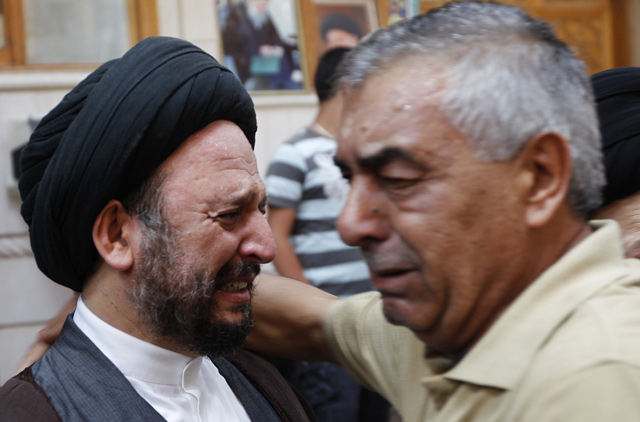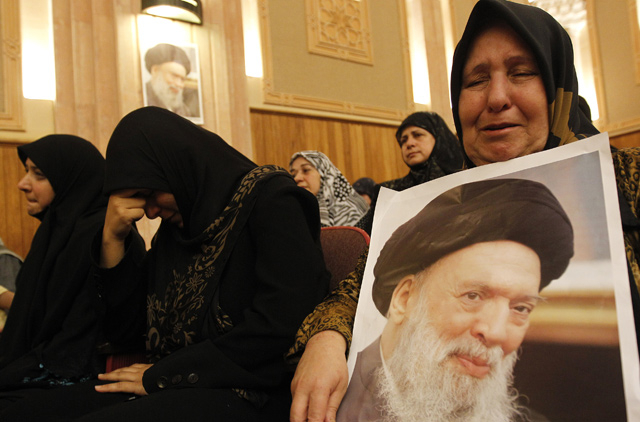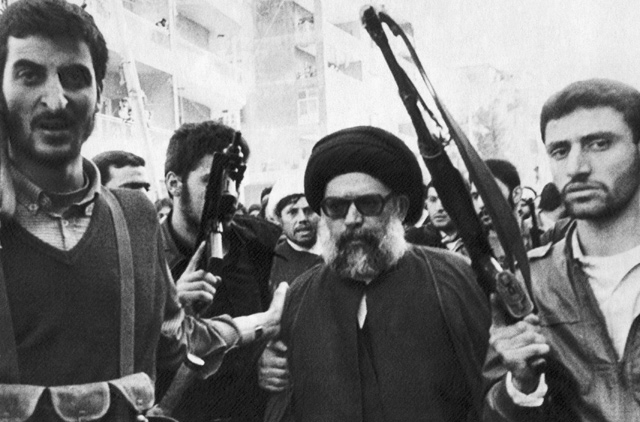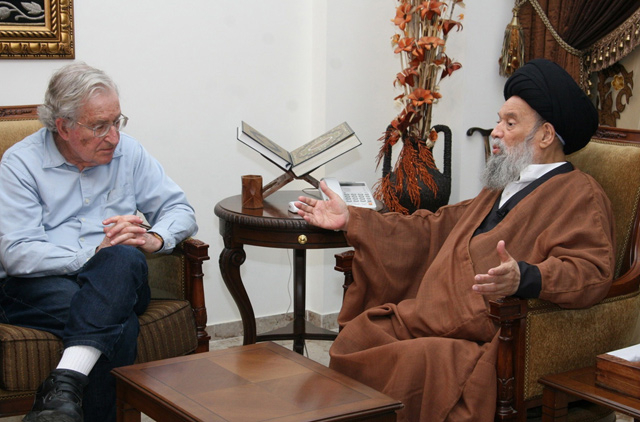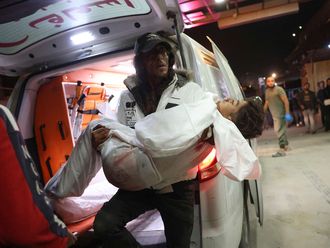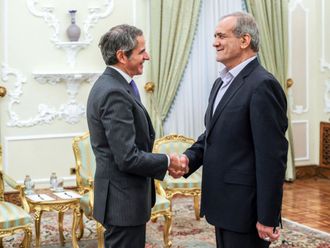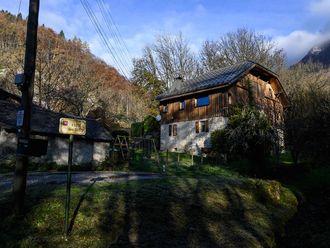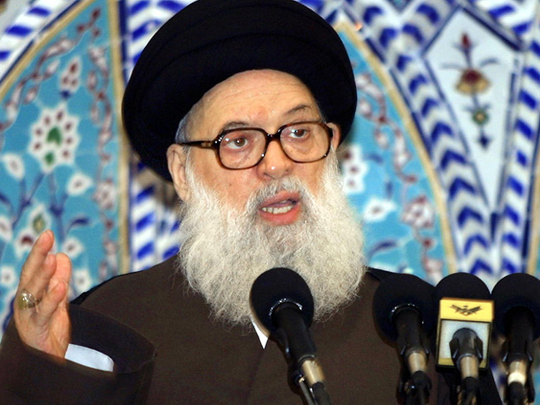
Damascus: The old wise man of Lebanon, Syed Mohammad Hussain Fadlallah, has died at the age of 75.
Fadlallah was more than a senior Shiite cleric, as the Western media has described him, and his influence spread throughout the Arab and Muslim World. His influence on Lebanon by far exceeds him being the spiritual founder and leader of Hezbollah and the inspiration behind its current secretary-general, Hassan Nasrallah.
Fadlallah was an intellectual and open-minded man of religion who had a social and political vision for Lebanon, one that encompassed all religions and sects rather than just Lebanese Shiites.
Although his nationality was Lebanese, Fadlallah was born in the holy city of Najaf in Iraq, in November 1935. His father Abdul Rauof Fadlallah had travelled to Najaf to learn theology and became a Shiite scholar. Under his father's towering influence, the young Fadlallah studied Islam at schools in Najaf. He returned to Lebanon at the age of 17 in 1952.
He briefly taught in schools in South Lebanon, only to head back to Iraq again for more religious education, returning as a full-fledged and respected scholar in 1966.
Mission
Military rule in Iraq made life in Najaf unbearable for the young cleric. Back in South Lebanon, Fadlallah began his mission of ministering to the human spirit, something he continued unto the very last, preaching at mosques, organising seminars, writing books, penning articles, and spending time with religious students. He founded a religious school called The Islamic Sharia Institute, a public library, a women's cultural centre and a medical clinic.
During this period, money was pouring in for the modernisation of Beirut and it came to be known as ‘Switzerland of the East'. Amid the development, entire Shiite districts — much to Fadlallah's horror — were completely neglected, receiving no more than 0.7 per cent of the state budget, although the Shiites back then made up 20 per cent of the Lebanese population.
The Shiite community's representatives in parliament were often feudal landlords who played truant at the cost of the electorate, making the Shiites an economic under-class during the boom years in Beirut. The leadership and spirituality of Fadlallah provided the community an escape route.
During this time, an Iran-born cleric, Mousa Al Sadr, emerged as the political leader of the Shiite community, while Fadlallah took the backseat as an academic who could be turned to for wise counsel.
Al Sadr dabbled in politics, founding a military branch for his Movement of the Dispossessed, also called Amal, while Fadlallah stuck to his books and monastic life. Al Sadr's sudden disappearance in 1978 created a vacuum in the Shiite community, filled temporarily by the un-charismatic notable, Hussain Al Hussaini. By 1982, a group of angry young men, all disciples of Fadlallah, emerged to form a small military group called Hezbollah. The most prominent members of this young brigade were Abbas Mousawi, Rageb Harb, Emad Mughniyeh and Hassan Nasrallah.
Many of those who formed the Hezbollah had been taught and disciplined for years either by Fadlallah or his cousin, Ayatollah Mohammad Baqer Al Hakim — another legend in his own right — or both.
On March 8, 1985, a car bomb loaded with 200 kilogrammes of dynamite exploded next to Fadlallah's home in Beirut, destroying a seven-floor building nearby and a cinema, killing 80 people and wounding another 256. Fadlallah emerged unscathed but the assassination attempt was testimony to the rising influence he now possessed in the Shiite community.
Critic of the US
After the Iraq war of 2003, Fadlallah made a name for himself as a staunch critic of US policy in the Middle East. "I say that America, in its policy that aspires to impose hegemony on the world is an evil with no good in it," he said.
He issued fatwas (religious decrees) calling for a boycott of US goods and prohibiting Muslims from helping US occupying forces in Iraq. In 2007, he lashed out at the Americans for their policies in Lebanon, blaming them for the stalemate that kept Baabda Palace with no president for six months. "The insanity of the US president and his administration is reflected in Lebanon by their ambassador pressuring the Lebanese people and preventing them from reaching an agreement over the presidential election," he said.
One of the things that made Fadlallah stand out among Shiites was his assertion that Ayatollah Khomeini's system of government, Veleyat-e-Faqih (theocratic rule) did not apply in Lebanon. Despite his closeness to Iran — he originally endorsed Grand Ayatollah Ali Al Sistani (now based in Iraq) for the post of Grand Ayatollah in Tehran after the passing of Khomeini — he maintained an excellent working relationship with Khomeini's successor, current Ayatollah Ali Khamenei.
Another memorable stand taken by Fadlallah was his view on women, whom he regarded as equal to men in every respect be it in nation building, politics, media or jihad.
On the occasion of the International Day for the Elimination of Violence Against Women, Fadlallah issued a fatwa saying a woman has a right to defend herself against an act of violence, whether social or physical. His office in the suburb of Beirut remained open around the clock, and so was his website (bayynat.org.lb) providing ready counsel to women complaining that they had been beaten or abused by men. He also helped those seeking a way out of troubled marriages.
Some facts about Fadlallah
- Fadlallah was a supporter of Iran's Islamic revolution and the spiritual leader of the Hezbollah movement when it was formed in 1982. His anti-Israeli rhetoric and calls for resisting Israel's occupation of southern Lebanon and the Palestinian territories prompted assassination attempts against him, including a 1985 car bomb that killed 80 people in southern Beirut. US news reports said the attack was carried out by a US-trained Lebanese intelligence unit after a series of attacks on US targets in Lebanon.
- He distanced himself from the abduction of Westerners by Islamic militant groups in Lebanon during the 1980s, saying he was against kidnappings and repeatedly called for their release.
- A fierce critic of US policy in the Middle East and its alliance with Israel, he first praised US President Barack Obama for showing "sincerity" when he said the United States was not at war with Islam. However he later criticised the US administration, saying it had deluded Arabs and Muslims into believing it would chart a course away from the policies of former President George W. Bush. He was once a classmate of Iranian Supreme Leader Ayatollah Ali Khamenei.
- Known in Shiite religious circles for having more moderate views, especially on women, than his conservative counterparts. He banned the Shiite practice of shedding blood during Ashura, when Shiites mourn the killing of Hussain, grandson of Prophet Mohammad (PBUH).
- He also issued a fatwa, or religious opinion, against honour killings and said women who are abused by their husbands could hit their husbands in self-defence.
- He founded several religious schools and the Mabarrat Association, a centre that provided social and medical services for the poor and built orphanages. A prolific writer, he wrote more than 40 books on Islam, politics and women, as well as many poems.
- He was born in the Iraqi city of Najaf in 1935 where he studied religious sciences. He also studied jurisprudence, logic, Arabic and philosophy before moving back to Lebanon in 1966.
- With inputs from agencies


